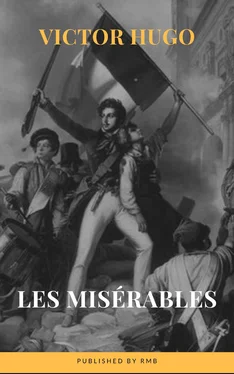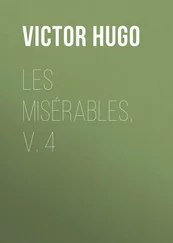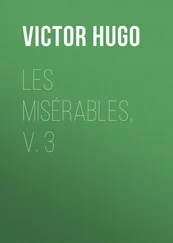Array RMB - Les Misérables
Здесь есть возможность читать онлайн «Array RMB - Les Misérables» — ознакомительный отрывок электронной книги совершенно бесплатно, а после прочтения отрывка купить полную версию. В некоторых случаях можно слушать аудио, скачать через торрент в формате fb2 и присутствует краткое содержание. Жанр: unrecognised, на английском языке. Описание произведения, (предисловие) а так же отзывы посетителей доступны на портале библиотеки ЛибКат.
- Название:Les Misérables
- Автор:
- Жанр:
- Год:неизвестен
- ISBN:нет данных
- Рейтинг книги:3 / 5. Голосов: 1
-
Избранное:Добавить в избранное
- Отзывы:
-
Ваша оценка:
- 60
- 1
- 2
- 3
- 4
- 5
Les Misérables: краткое содержание, описание и аннотация
Предлагаем к чтению аннотацию, описание, краткое содержание или предисловие (зависит от того, что написал сам автор книги «Les Misérables»). Если вы не нашли необходимую информацию о книге — напишите в комментариях, мы постараемся отыскать её.
Contains Active Table of Contents (HTML) and in the end of book include a bonus link to the free audiobook.
Sensational, dramatic, packed with rich excitement and filled with the sweep and violence of human passions, LES MISERABLES is not only superb adventure but a powerful social document. The story of how the convict Jean-Valjean struggled to escape his past and reaffirm his humanity, in a world brutalized by poverty and ignorance, became the gospel of the poor and the oppressed.
Les Misérables — читать онлайн ознакомительный отрывок
Ниже представлен текст книги, разбитый по страницам. Система сохранения места последней прочитанной страницы, позволяет с удобством читать онлайн бесплатно книгу «Les Misérables», без необходимости каждый раз заново искать на чём Вы остановились. Поставьте закладку, и сможете в любой момент перейти на страницу, на которой закончили чтение.
Интервал:
Закладка:
It was from this paradise that Monseigneur Welcome had passed to the other.
The announcement of his death was reprinted by the local journal of M. sur M. On the following day, M. Madeleine appeared clad wholly in black, and with crape on his hat.
This mourning was noticed in the town, and commented on. It seemed to throw a light on M. Madeleine's origin. It was concluded that some relationship existed between him and the venerable Bishop. "He has gone into mourning for the Bishop of D——" said the drawing-rooms; this raised M. Madeleine's credit greatly, and procured for him, instantly and at one blow, a certain consideration in the noble world of M. sur M. The microscopic Faubourg Saint-Germain of the place meditated raising the quarantine against M. Madeleine, the probable relative of a bishop. M. Madeleine perceived the advancement which he had obtained, by the more numerous courtesies of the old women and the more plentiful smiles of the young ones. One evening, a ruler in that petty great world, who was curious by right of seniority, ventured to ask him, "M. le Maire is doubtless a cousin of the late Bishop of D——?"
He said, "No, Madame."
"But," resumed the dowager, "you are wearing mourning for him."
He replied, "It is because I was a servant in his family in my youth."
Another thing which was remarked, was, that every time that he encountered in the town a young Savoyard who was roaming about the country and seeking chimneys to sweep, the mayor had him summoned, inquired his name, and gave him money. The little Savoyards told each other about it: a great many of them passed that way.
Chapter 5 Vague Flashes on the Horizon
Little by little, and in the course of time, all this opposition subsided. There had at first been exercised against M. Madeleine, in virtue of a sort of law which all those who rise must submit to, blackening and calumnies; then they grew to be nothing more than ill-nature, then merely malicious remarks, then even this entirely disappeared; respect became complete, unanimous, cordial, and towards 1821 the moment arrived when the word "Monsieur le Maire" was pronounced at M. sur M. with almost the same accent as "Monseigneur the Bishop" had been pronounced in D—— in 1815. People came from a distance of ten leagues around to consult M. Madeleine. He put an end to differences, he prevented lawsuits, he reconciled enemies. Every one took him for the judge, and with good reason. It seemed as though he had for a soul the book of the natural law. It was like an epidemic of veneration, which in the course of six or seven years gradually took possession of the whole district.
One single man in the town, in the arrondissement, absolutely escaped this contagion, and, whatever Father Madeleine did, remained his opponent as though a sort of incorruptible and imperturbable instinct kept him on the alert and uneasy. It seems, in fact, as though there existed in certain men a veritable bestial instinct, though pure and upright, like all instincts, which creates antipathies and sympathies, which fatally separates one nature from another nature, which does not hesitate, which feels no disquiet, which does not hold its peace, and which never belies itself, clear in its obscurity, infallible, imperious, intractable, stubborn to all counsels of the intelligence and to all the dissolvents of reason, and which, in whatever manner destinies are arranged, secretly warns the man-dog of the presence of the man-cat, and the man-fox of the presence of the man-lion.
It frequently happened that when M. Madeleine was passing along a street, calm, affectionate, surrounded by the blessings of all, a man of lofty stature, clad in an iron-gray frock-coat, armed with a heavy cane, and wearing a battered hat, turned round abruptly behind him, and followed him with his eyes until he disappeared, with folded arms and a slow shake of the head, and his upper lip raised in company with his lower to his nose, a sort of significant grimace which might be translated by: "What is that man, after all? I certainly have seen him somewhere. In any case, I am not his dupe."
This person, grave with a gravity which was almost menacing, was one of those men who, even when only seen by a rapid glimpse, arrest the spectator's attention.
His name was Javert, and he belonged to the police.
At M. sur M. he exercised the unpleasant but useful functions of an inspector. He had not seen Madeleine's beginnings. Javert owed the post which he occupied to the protection of M. Chabouillet, the secretary of the Minister of State, Comte Angeles, then prefect of police at Paris. When Javert arrived at M. sur M. the fortune of the great manufacturer was already made, and Father Madeleine had become Monsieur Madeleine.
Certain police officers have a peculiar physiognomy, which is complicated with an air of baseness mingled with an air of authority. Javert possessed this physiognomy minus the baseness.
It is our conviction that if souls were visible to the eyes, we should be able to see distinctly that strange thing that each one individual of the human race corresponds to some one of the species of the animal creation; and we could easily recognize this truth, hardly perceived by the thinker, that from the oyster to the eagle, from the pig to the tiger, all animals exist in man, and that each one of them is in a man. Sometimes even several of them at a time.
Animals are nothing else than the figures of our virtues and our vices, straying before our eyes, the visible phantoms of our souls. God shows them to us in order to induce us to reflect. Only since animals are mere shadows, God has not made them capable of education in the full sense of the word; what is the use? On the contrary, our souls being realities and having a goal which is appropriate to them, God has bestowed on them intelligence; that is to say, the possibility of education. Social education, when well done, can always draw from a soul, of whatever sort it may be, the utility which it contains.
This, be it said, is of course from the restricted point of view of the terrestrial life which is apparent, and without prejudging the profound question of the anterior or ulterior personality of the beings which are not man. The visible I in nowise authorizes the thinker to deny the latent I . Having made this reservation, let us pass on.
Now, if the reader will admit, for a moment, with us, that in every man there is one of the animal species of creation, it will be easy for us to say what there was in Police Officer Javert.
The peasants of Asturias are convinced that in every litter of wolves there is one dog, which is killed by the mother because, otherwise, as he grew up, he would devour the other little ones.
Give to this dog-son of a wolf a human face, and the result will be Javert.
Javert had been born in prison, of a fortune-teller, whose husband was in the galleys. As he grew up, he thought that he was outside the pale of society, and he despaired of ever re-entering it. He observed that society unpardoningly excludes two classes of men,— those who attack it and those who guard it; he had no choice except between these two classes; at the same time, he was conscious of an indescribable foundation of rigidity, regularity, and probity, complicated with an inexpressible hatred for the race of bohemians whence he was sprung. He entered the police; he succeeded there. At forty years of age he was an inspector.
During his youth he had been employed in the convict establishments of the South.
Before proceeding further, let us come to an understanding as to the words, "human face," which we have just applied to Javert.
The human face of Javert consisted of a flat nose, with two deep nostrils, towards which enormous whiskers ascended on his cheeks. One felt ill at ease when he saw these two forests and these two caverns for the first time. When Javert laughed,—and his laugh was rare and terrible,—his thin lips parted and revealed to view not only his teeth, but his gums, and around his nose there formed a flattened and savage fold, as on the muzzle of a wild beast. Javert, serious, was a watchdog; when he laughed, he was a tiger. As for the rest, he had very little skull and a great deal of jaw; his hair concealed his forehead and fell over his eyebrows; between his eyes there was a permanent, central frown, like an imprint of wrath; his gaze was obscure; his mouth pursed up and terrible; his air that of ferocious command.
Читать дальшеИнтервал:
Закладка:
Похожие книги на «Les Misérables»
Представляем Вашему вниманию похожие книги на «Les Misérables» списком для выбора. Мы отобрали схожую по названию и смыслу литературу в надежде предоставить читателям больше вариантов отыскать новые, интересные, ещё непрочитанные произведения.
Обсуждение, отзывы о книге «Les Misérables» и просто собственные мнения читателей. Оставьте ваши комментарии, напишите, что Вы думаете о произведении, его смысле или главных героях. Укажите что конкретно понравилось, а что нет, и почему Вы так считаете.












